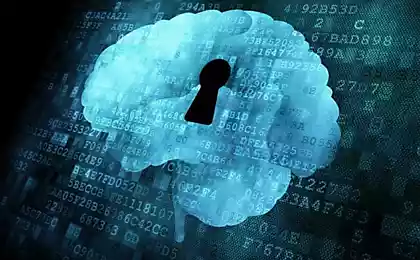323
The quirks of the human mind: 8 reasons why you should not trust yourself
Bertrand Russell once said, “The whole problem with this world is that fools and fanatics are always confident, and smart people are full of doubts.”
Mark Manson has collected eight reasons why you should question all your beliefs and memories.

1. You are biased and selfish without realizing it. In psychology, there is such a thing as “observer bias.” It can be explained in this example: say, you are at an intersection and you see someone moving at a red light. Surely you immediately think that this selfish and inattentive scumbag, which creates a dangerous situation for other drivers to save a few seconds of time.
On the other hand, if you are someone who is going through a red light, you will find all sorts of excuses.
When someone else does it, he is a terrible person; but when you do it, there is nothing wrong with it.
We all do that. Especially in conflict situations. When people talk about someone who angered them, they invariably describe the other person’s actions as meaningless, reprehensible, and motivated by the intent to cause suffering.
But speaking of cases where they have harmed someone, people can come up with a variety of reasons to characterize their actions as reasonable and justified. Harm caused to other people is regarded as insignificant, and accusations against oneself are considered unfair and unfounded.
But neither opinion can be right. In fact, both of these views are wrong. Research by psychologists has found that both perpetrators and victims distort facts about the situation to fit their narrative.
Steven Pinker calls it the “moralization gap.” This means that whenever a conflict occurs, we overestimate our own good intentions and underestimate the intentions of others. Then a downward spiral is created, where we believe that others deserve a more severe punishment, and we deserve a less severe one.
Of course, all this happens unconsciously. People think they are reasonable and objective. But it's not.
2. You have no idea what makes you happy (or unhappy) In his book Stumbling About Happiness, Harvard psychologist Daniel Gilbert explains that we can’t remember exactly what an event in the past has caused us to feel or predict what feelings something will cause in the future.

For example, if your favorite sports team loses a decisive game, you will be terribly upset. But it turns out that the memory of how bad you felt doesn’t match what you actually felt. In fact, you tend to remember a bad event as much worse and a good event as much better than it actually was.
The same goes for future expectations. We overestimate how much something good or unpleasant will make us happy. Often we don’t even realize what we’re really feeling right now.
This is just another argument not to chase happiness. Everything points to the fact that we don’t even know what happiness is and what to do with it if we suddenly achieve it.
3. You are easily manipulated in making the wrong decisions. Have you met people on the street handing out “free” brochures or books? But as soon as you take something from them, you are asked to join something or donate money to something. The resulting feeling of awkwardness does not allow you to say “no” because you have just been given something “free” and you do not want to appear as an asshole.
Yeah, it's on purpose.
It turns out that decision-making can be easily influenced in various ways. One is to give someone a “gift” before asking them for a favor. The likelihood that you will achieve what you want increases significantly.
Or try this: the next time you want to get in without a queue, address the person in front with any excuse, such as “I’m in a hurry” or “I’m sick.” According to experiments, the chances of being missed will increase by about 80% than if you ask without giving any explanation. The most surprising thing is that the explanation doesn’t even make sense.
Behavioral economists have found something similar.
Another example is that if I told you that for $2,000, you could get a trip to Paris with breakfast included, or a trip to Rome with breakfast included, or a trip to Rome without breakfast included. It turns out that adding a "Rome without breakfast included" option makes more people choose Rome over Paris. Why? Because "Rome with Breakfast" sounds more tempting than "Rome without Breakfast" and the brain forgets about Paris.
4. To support your existing beliefs, you tend to use only logic and reason. The researchers found that some people with damage to parts of the brain responsible for vision still "see" but they don't even know it. These people are blind and they will tell you they can’t see their hands in front of their faces. But if you bring a flash of light to them alternately on the left and right, they will correctly guess which side it was more often.
But they will say that this is just a guess.
They have no conscious idea which side of the light is, but somehow they know it.
This illustrates a funny quirk of the human mind: knowledge and the sense of knowledge are two very different things.
As blind people, we can all have knowledge without realizing it. But the opposite is true: you may feel like you know something, but you don’t.
Most often, all sorts of prejudices and logical errors are based on this. When we don't recognize the difference between what we really know and what we just think we know.
5. Emotions affect your perception far more than you think. Most people make the worst decisions in their lives based on their emotions. For example, a colleague joked about your shoes, and you were upset because you received them as a gift from your grandmother before she died. Out of frustration, you can quit your job and live on welfare. Not exactly a rational decision.
But that's not all.
Just avoiding important decisions during an emotional outburst is not enough. Emotions influence your decisions even days, weeks, and months after you’ve calmed down and “analyzed” the situation. Even more surprising and counterintuitive is that relatively mild and short-lived emotions experienced at some point in time can negatively affect decision-making in the long run.
Essentially, you often use the memory of once-experienced emotions as the basis for decisions you make, perhaps months or years later. You do this constantly and unconsciously. Speaking of memories. . .
6. Your memory is useless. Elizabeth Loftus is one of the world’s leading memory researchers. And she says your memory is no good.
Loftus found that our memories of past events are easily altered by other past experiences or new incorrect information. It made everyone realize for the first time that witness testimony is not the gold standard, as previously thought in courtrooms.
Loftus and other researchers found that:
• Over time, our memories of events not only fade, but also become more susceptible to false information.
• Warning people that their memories may contain false information does not always help eliminate false information.
• The more you worry, the more likely you are to include false information in your memories.
• Memories can not only be changed by false information. All memories can be planted. This is especially true for family members or other people we trust.
So our memories are far from as reliable. Even the ones we're sure of.
Neuroscientists can predict whether you may have inaccuracies in your memories of specific events based on your picture of brain activity at the time of the experience. In some cases, it seems that poor memory is simply built right into the brain’s software. But why?
At first, it may seem that Mother Nature has made a joke on human memory. After all, who wants to use a computer that constantly loses or changes files once you stop working with them?
But the brain does not store spreadsheets, text files and gifs with cats. Yes, our memories help us learn from past events that theoretically help us make informed decisions in the future. But memory actually has a different function that we rarely think about. This feature is much more important and much more complex than simply storing information.
As humans, we need individuality, an understanding of who we are, to navigate complex social situations. Memories help us create our identity by giving us a history of our past.
It doesn’t really matter how accurate your memories are. The main thing is that in your head there is a history of your past that creates a sense of who you are. Instead of using 100% accurate versions of memories, it’s actually easier to resort to fuzzy memory and fill it up on the fly with details that match the version of ourselves we’ve created and embraced.
7. You're not who you think you are. Consider the following point: the way you present and express yourself on, say, Facebook is probably different from the way you are offline. Your behavior with your grandmother is probably very different from how you behave with your friends. You have different versions of yourself: "working", "home", "in the family", "with yourself" and many other "personalities" that you use to navigate and survive in a complex social world.
Which of these versions is “true” you?
Over the past couple of decades, social psychologists have begun to reveal something that many of us find difficult to accept: the notion of the immutability of the core of the personality and the permanent self is all an illusion.
New research is exploring how the brain constructs an image of itself and how psychedelic drugs can temporarily alter the brain to dissolve your sense of self, demonstrating just how transient and illusory personalities are.
The irony is that all these unusual experiments, published in modern books and journals, basically say the same thing as monks in Eastern philosophy for several millennia. They had to sit in caves for years and not think about anything.
In the West, the idea of the individual self is central to many areas of culture, not to mention the advertising industry. We are so fixated on figuring out who we are that we rarely wonder if the concept is useful. Thoughts about our “individuality” and “search for ourselves” hinder us as much as they help. They may be limiting us more than liberating us. Of course, it’s good to know what you want or like, but you can pursue your dreams and goals without relying on rigid self-images.
8. Your physical perception of the world is not so real.
You are endowed with an incredibly complex nervous system that constantly sends information to the brain. By some estimates, your sensory systems — vision, touch, smell, hearing, taste — send about 11 million bits of information to your brain every second.
This is a tiny part of the physical reality around you. The light we see is an extremely small range of the electromagnetic spectrum. Birds and insects distinguish parts of it that are not available to us. Dogs can hear sounds and smell things we don’t know exist. Our nervous system is not a device for collecting data, but for filtering it.

On top of all this, the conscious mind seems to be able to process only about 60 bits of information per second when you are engaged in “mental” activities (reading, playing a musical instrument, etc.).
5 Conditions Required for Intimacy
Don't abandon yourself!
It turns out that at best you are aware of 0.00005454% of the already heavily altered information that your brain receives every second of waking.
For comparison, imagine that behind every word you see and read in this article, there are 536,303,630 other words that you don’t see.
This is how our lives go day after day.
P.S. And remember, just changing our consumption – together we change the world!
Source: cameralabs.org/10210-prichudy-chelovecheskogo-razuma-ili-8-prichin-po-kotorym-ne-stoit-doveryat-sebe
Mark Manson has collected eight reasons why you should question all your beliefs and memories.

1. You are biased and selfish without realizing it. In psychology, there is such a thing as “observer bias.” It can be explained in this example: say, you are at an intersection and you see someone moving at a red light. Surely you immediately think that this selfish and inattentive scumbag, which creates a dangerous situation for other drivers to save a few seconds of time.
On the other hand, if you are someone who is going through a red light, you will find all sorts of excuses.
When someone else does it, he is a terrible person; but when you do it, there is nothing wrong with it.
We all do that. Especially in conflict situations. When people talk about someone who angered them, they invariably describe the other person’s actions as meaningless, reprehensible, and motivated by the intent to cause suffering.
But speaking of cases where they have harmed someone, people can come up with a variety of reasons to characterize their actions as reasonable and justified. Harm caused to other people is regarded as insignificant, and accusations against oneself are considered unfair and unfounded.
But neither opinion can be right. In fact, both of these views are wrong. Research by psychologists has found that both perpetrators and victims distort facts about the situation to fit their narrative.
Steven Pinker calls it the “moralization gap.” This means that whenever a conflict occurs, we overestimate our own good intentions and underestimate the intentions of others. Then a downward spiral is created, where we believe that others deserve a more severe punishment, and we deserve a less severe one.
Of course, all this happens unconsciously. People think they are reasonable and objective. But it's not.
2. You have no idea what makes you happy (or unhappy) In his book Stumbling About Happiness, Harvard psychologist Daniel Gilbert explains that we can’t remember exactly what an event in the past has caused us to feel or predict what feelings something will cause in the future.

For example, if your favorite sports team loses a decisive game, you will be terribly upset. But it turns out that the memory of how bad you felt doesn’t match what you actually felt. In fact, you tend to remember a bad event as much worse and a good event as much better than it actually was.
The same goes for future expectations. We overestimate how much something good or unpleasant will make us happy. Often we don’t even realize what we’re really feeling right now.
This is just another argument not to chase happiness. Everything points to the fact that we don’t even know what happiness is and what to do with it if we suddenly achieve it.
3. You are easily manipulated in making the wrong decisions. Have you met people on the street handing out “free” brochures or books? But as soon as you take something from them, you are asked to join something or donate money to something. The resulting feeling of awkwardness does not allow you to say “no” because you have just been given something “free” and you do not want to appear as an asshole.
Yeah, it's on purpose.
It turns out that decision-making can be easily influenced in various ways. One is to give someone a “gift” before asking them for a favor. The likelihood that you will achieve what you want increases significantly.
Or try this: the next time you want to get in without a queue, address the person in front with any excuse, such as “I’m in a hurry” or “I’m sick.” According to experiments, the chances of being missed will increase by about 80% than if you ask without giving any explanation. The most surprising thing is that the explanation doesn’t even make sense.
Behavioral economists have found something similar.
Another example is that if I told you that for $2,000, you could get a trip to Paris with breakfast included, or a trip to Rome with breakfast included, or a trip to Rome without breakfast included. It turns out that adding a "Rome without breakfast included" option makes more people choose Rome over Paris. Why? Because "Rome with Breakfast" sounds more tempting than "Rome without Breakfast" and the brain forgets about Paris.
4. To support your existing beliefs, you tend to use only logic and reason. The researchers found that some people with damage to parts of the brain responsible for vision still "see" but they don't even know it. These people are blind and they will tell you they can’t see their hands in front of their faces. But if you bring a flash of light to them alternately on the left and right, they will correctly guess which side it was more often.
But they will say that this is just a guess.
They have no conscious idea which side of the light is, but somehow they know it.
This illustrates a funny quirk of the human mind: knowledge and the sense of knowledge are two very different things.
As blind people, we can all have knowledge without realizing it. But the opposite is true: you may feel like you know something, but you don’t.
Most often, all sorts of prejudices and logical errors are based on this. When we don't recognize the difference between what we really know and what we just think we know.
5. Emotions affect your perception far more than you think. Most people make the worst decisions in their lives based on their emotions. For example, a colleague joked about your shoes, and you were upset because you received them as a gift from your grandmother before she died. Out of frustration, you can quit your job and live on welfare. Not exactly a rational decision.
But that's not all.
Just avoiding important decisions during an emotional outburst is not enough. Emotions influence your decisions even days, weeks, and months after you’ve calmed down and “analyzed” the situation. Even more surprising and counterintuitive is that relatively mild and short-lived emotions experienced at some point in time can negatively affect decision-making in the long run.
Essentially, you often use the memory of once-experienced emotions as the basis for decisions you make, perhaps months or years later. You do this constantly and unconsciously. Speaking of memories. . .
6. Your memory is useless. Elizabeth Loftus is one of the world’s leading memory researchers. And she says your memory is no good.
Loftus found that our memories of past events are easily altered by other past experiences or new incorrect information. It made everyone realize for the first time that witness testimony is not the gold standard, as previously thought in courtrooms.
Loftus and other researchers found that:
• Over time, our memories of events not only fade, but also become more susceptible to false information.
• Warning people that their memories may contain false information does not always help eliminate false information.
• The more you worry, the more likely you are to include false information in your memories.
• Memories can not only be changed by false information. All memories can be planted. This is especially true for family members or other people we trust.
So our memories are far from as reliable. Even the ones we're sure of.
Neuroscientists can predict whether you may have inaccuracies in your memories of specific events based on your picture of brain activity at the time of the experience. In some cases, it seems that poor memory is simply built right into the brain’s software. But why?
At first, it may seem that Mother Nature has made a joke on human memory. After all, who wants to use a computer that constantly loses or changes files once you stop working with them?
But the brain does not store spreadsheets, text files and gifs with cats. Yes, our memories help us learn from past events that theoretically help us make informed decisions in the future. But memory actually has a different function that we rarely think about. This feature is much more important and much more complex than simply storing information.
As humans, we need individuality, an understanding of who we are, to navigate complex social situations. Memories help us create our identity by giving us a history of our past.
It doesn’t really matter how accurate your memories are. The main thing is that in your head there is a history of your past that creates a sense of who you are. Instead of using 100% accurate versions of memories, it’s actually easier to resort to fuzzy memory and fill it up on the fly with details that match the version of ourselves we’ve created and embraced.
7. You're not who you think you are. Consider the following point: the way you present and express yourself on, say, Facebook is probably different from the way you are offline. Your behavior with your grandmother is probably very different from how you behave with your friends. You have different versions of yourself: "working", "home", "in the family", "with yourself" and many other "personalities" that you use to navigate and survive in a complex social world.
Which of these versions is “true” you?
Over the past couple of decades, social psychologists have begun to reveal something that many of us find difficult to accept: the notion of the immutability of the core of the personality and the permanent self is all an illusion.
New research is exploring how the brain constructs an image of itself and how psychedelic drugs can temporarily alter the brain to dissolve your sense of self, demonstrating just how transient and illusory personalities are.
The irony is that all these unusual experiments, published in modern books and journals, basically say the same thing as monks in Eastern philosophy for several millennia. They had to sit in caves for years and not think about anything.
In the West, the idea of the individual self is central to many areas of culture, not to mention the advertising industry. We are so fixated on figuring out who we are that we rarely wonder if the concept is useful. Thoughts about our “individuality” and “search for ourselves” hinder us as much as they help. They may be limiting us more than liberating us. Of course, it’s good to know what you want or like, but you can pursue your dreams and goals without relying on rigid self-images.
8. Your physical perception of the world is not so real.
You are endowed with an incredibly complex nervous system that constantly sends information to the brain. By some estimates, your sensory systems — vision, touch, smell, hearing, taste — send about 11 million bits of information to your brain every second.
This is a tiny part of the physical reality around you. The light we see is an extremely small range of the electromagnetic spectrum. Birds and insects distinguish parts of it that are not available to us. Dogs can hear sounds and smell things we don’t know exist. Our nervous system is not a device for collecting data, but for filtering it.

On top of all this, the conscious mind seems to be able to process only about 60 bits of information per second when you are engaged in “mental” activities (reading, playing a musical instrument, etc.).
5 Conditions Required for Intimacy
Don't abandon yourself!
It turns out that at best you are aware of 0.00005454% of the already heavily altered information that your brain receives every second of waking.
For comparison, imagine that behind every word you see and read in this article, there are 536,303,630 other words that you don’t see.
This is how our lives go day after day.
P.S. And remember, just changing our consumption – together we change the world!
Source: cameralabs.org/10210-prichudy-chelovecheskogo-razuma-ili-8-prichin-po-kotorym-ne-stoit-doveryat-sebe























